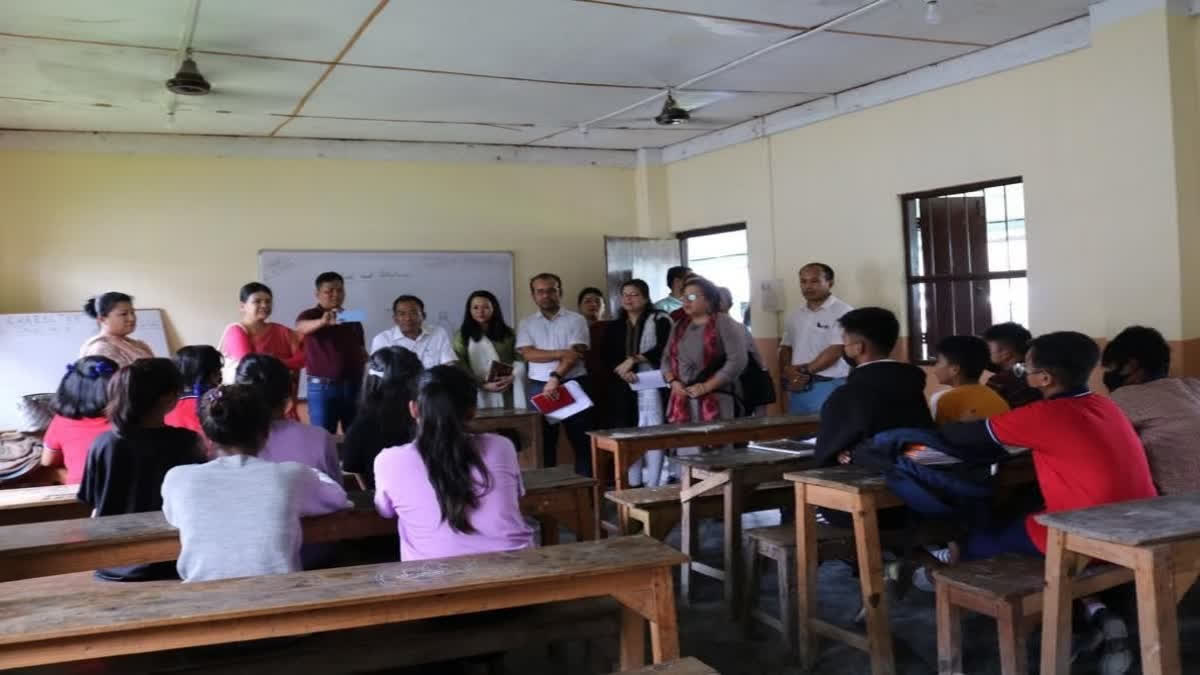New Delhi: When elephants fight, it is the grass that suffers, so goes the African proverb. And that is exactly what is happening to students of both schools and colleges of Manipur in the ongoing ethnic conflict that has claimed over 150 lives. Formal education came to a complete halt in both the Imphal Valley and Churachandpur since the ethnic conflict broke out between the majority Meiteis of the valley and the Kukis of the hills on May 3. Though classes in some schools in the valley have been started on a trial basis, the situation remains unchanged in Churachandpur.
“There has been no form of education at all in Churachandpur for the last three months,” J Haokip, founder of the Bethesda Khankho Foundation, which runs the Bethesda Academy school in Churachandpur, told ETV Bharat. “Only for the last two to three weeks, some people started private tuition classes. But, this is only for a few people like the rich and the elite and those living in secure areas like the heart of Churachandpur town.”
There are around 80 private schools and 10 colleges in Churachandpur and its surrounding areas. So, even if one takes an average of 500 students per school and 1,000 students per college, the future of at least 50,000 students in Churachandpur is at stake. Most of the schools and colleges in Churachandpur have been turned into relief centres for those affected by the conflict.
"But more importantly, it is the continuing violence that is the problem. Unless the attacks stop, we can’t start formal classes,” Haokip said. “In the case of our Bethesda Academy, we are sending teachers to different villages to conduct some form of education.” He said that with formal classes not being held, students are roaming around the streets of Churachandpur.
Also read: MHA and Kuki rebel organisations to talk on separate political identities for Kukis in Manipur
“The only thing they see is guns,” Haokip said. “They are only getting news about the violence. There is no internet. Their mind has become corrupted. Even two-year-old kids are playing with imaginary guns.” But what about reports suggesting that students from Churachandpur are taking admissions in educational institutes outside the state? “Very few,” Haokip replied. “Some Class XI and XII students are going out. But, they will face a culture shock if they go to other parts of India. They are already traumatised.”
According to reports, educational institutes in Karnataka and Kerala have opened their doors to students from the strife-torn northeastern state. Around 200 students from Manipur have taken admitted to various schools and colleges of Karnataka. The University of Kannur in Kerala has also decided to open its doors to students from Manipur who could not continue their education.
An Imphal-based academician, speaking to ETV Bharat on the condition of anonymity, said that it is easier for school students to go out and take admission to educational institutes in other parts of the country. But, students of higher education do not have this flexibility. Like in Churachandpur, most of the schools and colleges in Imphal Valley have been turned into relief camps or are being occupied by central security forces. Imphal East, Imphal West, Moirang and Bishnupur are the most affected districts in the valley.
However, some semblance of normalcy in terms of formal education has started returning to the valley. Over the last month, some schools have started Classes I to VIII on a trial basis. Similarly, classes IX to XII have also been started in some schools over the last week. According to the Imphal-based academician, first semester exams of colleges under Manipur University (MU), a central university, have been completed. The MU allowed students living in the affected hill areas to appear for their exams from their respective places of stay. Question papers were sent and answer sheets were brought with the help of security forces. As many as 98 per cent of all colleges in Manipur are affiliated with MU. There are around 90 colleges in Manipur, including 40 government colleges
Dhanamanjari University (DMU), the other university in Imphal, has seven colleges affiliated with it, none of which is located outside of the Imphal Valley. The DMU, too, started the examination process, but it was late, according to the academician. He further said that despite all the disturbances, the admission process in all colleges has been completed even in those that are occupied by security forces or are being used as relief camps. But, the big problem is the commuting of teachers between the valley and the affected hill areas. “Teachers in Imphal Valley are facing problems in going to the hill areas,” the academician said. “Similarly, teachers living in hill areas are also afraid of coming to the valley. Even Tata Sumo drivers are not operating their vehicles.”



